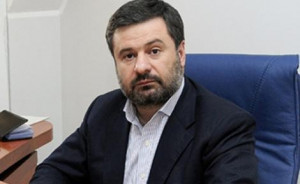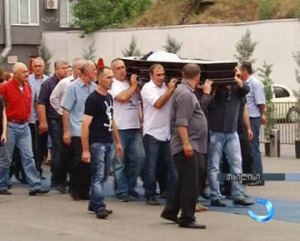
Potskhitshvili states that Silverman is well known for reporting “startling news”. He has once again claimed the centre of attention following the recent murder of politician, media tycoon and diplomat Erosi Kitsmariahvili,
Kitsmarishvili was found dead in his car, with a gunshot wound to the head, on July 15. According to his family and associates he had been making plans for the future that day, and the relative positions of body and gun make it almost 100% certain that it was not a suicide. Kitsmarishvili however did have a history of hostility to the previous Georgian government, once having a pen thrown at him by an MP for refusing to accept that government’s position on who really started the 2008 Russia-Georgia war.
This unexplained death has aroused intense interest because it is part of a pattern. As Silverman says in the interview, “few high profile killings in Georgia happen outside of political agendas and apparently the pattern is again being repeated.” Other murders of this type include that of former Prime Minister Zurab Zhvania, whose highly suspicious demise in 2004 was first blamed on a motorcycle idling outside his window and then a leaking Iranian gas heater—just at the time George W. Bush was presenting Iran as the latest member of the Axis of Evil. The Iranian heater story was also confirmed by a FBI agent assigned to the US Embassy at this time. This story has been deflated in the local media by Silverman and other journalists.
Here Silverman makes some important remarks to Georgian weekly Asaval-Dasavali, which were first published on July 21, 2014.
Calling a spade a spade
In the last two weeks Silverman has shared a range of material with the Georgian media, involving “the shifting of the sands in Ukraine,” the Ukrainian airplane story and the latest things he has been following in various local and international media outlets.
He has described how the United National Movement [the party of deposed president Mikheil Saakashvili] has been pushing the government to make some sort of public resolution condemning Russian support for the anti-Kiev Eastern Ukrainians (let’s call them what they are). This demand may just be a lame last attempt at diversion, or something more sinister may be involved.
Now Kitsmarishvili is dead, in what looks, from experience, like another National Movement extrajudicial action, there appears to be no going back. Things may get worse before they get better. What happens next in Georgia may be a game changer for the region.
World class hired guns to fight crime
The new Georgian government has been criticised in some quarters for not taking stronger action against those who made such murders a permanent feature of Georgian life under the old regime. It has therefore called on the support of some “World Class” prosecutors to assist it with the upcoming prosecutions of former high-ranking government members. Everyone, including insiders, suspects that these include Saakashvili. The latest word is that he’s skulked off to Zurich, a country he has no known connection with unless it is another secret home.
These inquisitors have already arrived in Georgia, according to local media reports, and they are not lightweights. Some have connections with the International Criminal Court, including Sir Geoffrey Nice, who led the prosecution of Serbian President Slobodan Milosevic and was even involved in investigating claims of torture in Syria. Also on the ground in Tbilisi is Moshe Lador of Israel, who was involved in bringing charges against former Israeli PM Ehud Olmert and other high ranking officials.
It is also no coincidence that Paul Coffey, from the US State Department’s Organized Crime Division is now in Georgia. He is also the former director of the UN Mission in Kosova. The antics of the previous Georgian government would not be described as “political” if anyone else did them, as under its rule Georgia bore all the hallmarks of a mafia state.
Silverman stated: “after the alleged murder-suicide of Erosi I was asked by those I work with –Veterans Today and other journals, people involved with issues of due diligence and those interested in Georgia’s investment climate, to start investigating this killing not from a criminal perspective but its larger ramifications: economic and geopolitical. Their specific interest is in determining if there were any connections with regional events, or links with any potential false flag attacks in Georgia and the region in the not-too-distant future.
“To help me in this effort I was provided with names of people I suspect may be related to Erosi Kitsmariahvili, the former Georgian Ambassador to Russia and owner of Georgian TV Channel Rustavi2. They include Otar Orjonikidze, Lado Datashvili and Valeria Zumbadze, who all work for Georgian counterintelligence. So far I have not been able to collect specific information, but I know they are involved in the activities of informal groups, such as summary executions. I have spoken to people who were tortured in prison by them.
“These people were involved in many of the tortures conducted under the former government and somehow they are still working in Georgian counterintelligence under the current government. Aside from many other crimes, Otar Orjonikidze is also connected to the Lapankuri case, in which Chechen fighters were recruited, sent to Georgia, taken to the mountains and then ambushed as part of a programme of clearing up loose ends.
“Those who survived this cull were provided with passports and given safe passage to Turkey, but then terminated, either on entering Turkish territory or before they arrived in Syria, where they had been given the opportunity to take up arms in support of the US and CIA-sponsored Free Syria Army trying to overthrow the central Syrian government of President Assad.”
Nothing has changed

“We know that the US does not want to see Saakashvili in power again and is satisfied by the nominees of his immediate replacement Bidzina Ivanishvili, at least for now. The problem is that the former system is deeply rooted and has not changed. The Akhalaia-Merabishvili clan [Merabishvili is the former Interior Minister also facing a multitude of charges] is still supported by vested interests who are trying to complicate the situation in Georgia.
“The most dangerous of the people still roaming around is Gia Bokeria, a member of the National Security Council and one of those who conducted the Rose Revolution; he stays hidden from sight, but is still involved in these processes, managing daily events, at least for now.
“Bokeria and those like him control the assassination programme in Georgia. They organized Lapanakuri. They are not as visible as Bacho Akhalaia but they are involved in many nasty cases, including organized crime. I am here to prove nothing, but the people who have asked me to investigate have more than suspicions about the work of Otar, Lado, Valeri, Giga, etc and all the connections with Erosi’s murder.”
Bokeria is now under media and criminal investigation for having stolen money from the government and diverted it for PR in support of the former ruling National Party by signing off on documents [as if] the expenditures were classified as for covert secret contacts, a matter of national security.
Motivation to Kill
“Erosi had a lot of information,” Silverman continues. “Do not forget that during the Georgia-Russia war in 2008 he was Georgian Ambassador to Russia. He also knew a great deal about the “Rose Revolution” and all drugs and weapons trafficking, which are not only controlled from within Georgia.
“The Port of Poti is very important in this; it being used by the US and Turkey as a transit point for materials for Syria and Iraq, such as those being delivered to ISIS. This relates not only to Erosi’s killing but also the current situation in Georgia. It goes without saying that the US and its allies are now focused on Syria. In order to solve their military problems they need Georgia as never before.
“One more detail: when Erosi decided to stand for Mayor of Rustavi, his home city, earlier this year he dealt with the Mafia, and got election funding from them, but did not pay it back. According to my sources Saakashvili and his entourage are going to take revenge on the government in September by provoking disorder in the independent-minded Samegrelo region of West Georgia, and I think Erosi knew about this too. Informal groups active during Saakashvili’s period still exist in Samegrelo and are being paid by Saakashvili’s people from the proceeds of crime, including weapon and drug sales proceeds. But where does this money come from?
“Erosi knew all the above-mentioned rather well, and that is why he was dangerous to the government which knows it has no choice but to make a last ditch attempt to get back into power at any cost. This may explain the timing of his death, before the arrival of the overseas investigators.
Not a real government
“Today PM Irakli Gharibashili is not in the position to decide anything. Saakashvili has left but his system is still working, and the members of the current government are hostages of that system. Everything which has happened in Georgia, including Zhvanias’s assassination, has been covered up with the help of US investigators. All these things are interconnected.
“All signs point to Erosi being assassinated by a professional. It seems someone wanted to scare people to shut them up. Erosi was dangerous, because his words were important to the media within and outside Georgia. He also was trying to monopolise the media in Georgia, and knew who owned what and who controlled what, and not just on paper.”
As reported by InterpressNews, the Georgian PM recently told Saakashvili’s party and the Georgia people that justice will be served.
“Every injustice, established by your government, will be responded; I, as the Prime Minister, promise that I will not forgive what all has happened. I promise that all cases launched in the Prosecutor’s Office, will be brought to the end. The dignity and freedom that you took away from the citizens will be restored by our government,” Gharibashvili told the National Movement.”
This does not come as good news for those in the EU, such as Carl Bildt and others who has been staunching supporting the former regime, and allegations are still fresh for the former presidents’ direct involvement a number of high profile cases, especially high stakes corruption and the alleged murder of Prime Minister Zurab Zhvania. Even some of those involved in the autopsy, including the head of the forensic bureau; they all ended up dead.
Silverman concluded his interview by asking a question he perhaps knows the answer to. “I want to ask Otar Orjonikidze, deputy head of Georgian counterintelligence, through your newspaper – what connection do you have with, and what do you know about, Erosi’s assassination?”
Henry Kamens, columnist, expert on Central Asia and Caucasus, in close collaboration with Georgian Journalist Nato Potskhishvili exclusively for the online magazine “New Eastern Outlook”.
